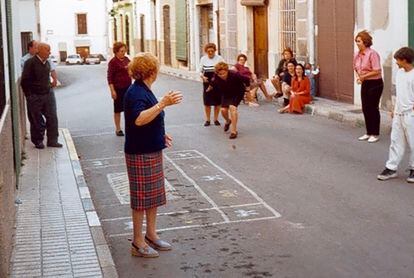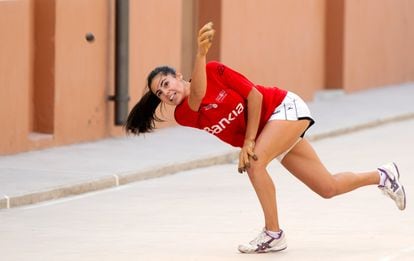Victoria Díez is the pilot’s number one. Six Individual Championship titles shine on her record. On Sunday, this 23-year-old Biotechnology student was crowned champion of the Lliga CaixaBank. When Victoria was a child she had to play against boys and many, after being defeated, refused to shake her hand. She didn’t understand it, but there weren’t many girls to play against. Despite everything, Victoria, a pelotari born in the 21st century, cannot even imagine the difficulties that women had in the past. Two researchers, the anthropologist Helena Paricio and the sociologist Víctor Agulló, have done sports archeology to find out the relationship between women and this ancestral game, and the fruit of that research is a book titled Gifts and Pilot.
The work, published by the Valencian Pilot Chair of the University of Valencia, travels through the towns where a few women dared to defy the prohibitions and conventions of the time, rolled up their skirts and had fun playing with their hands with a small ball of fur Some achieved a certain celebrity in their region, as is the case of a woman from Catamarruc (El Comtat) with a poisoned left foot who earned the nickname corner of focus.
Very few dared to play by hand for decades. In recent years a lot of progress has been made and there are even semi-professionals, such as Victoria Díez or Mar Giménez. It hasn’t been difficult. In 2011 there were 20 women’s federation tokens and ten years later, in 2021, there were already 300. In the Jocs Escolar they go faster and in 2023 they already reached 659 girls. Encouraging figures but still far from those for men: 1,680 federated members, with fifty professional pilotaris, and 2,074 children signed up for the Jocs Escolares.
In the 20th century they were a rarity. The authors of the book speak of pilotaris, or pilotsfrom Murla, where there has always been a very lively presence and where women have actively participated in playing since they were little, travessant and as fans. They suffered especially during the Franco regime and very few dared to challenge the regime. That was the case of the brave women of Terrateig (the Vall d’Albaida) like Consuelo Climent (Consuelo Moliner), Encarnación García The Casino or Rosario Ferrer, better known as Rosario de Camilo. Three of those who, on Sundays, after mass, stood in the town square to play pilota. La Vall was a region where it was easier to see some women who were fond of handball, such as Encarna Segrelles or Milagros Calatayud, Víctor Agulló’s aunt and the person who instilled in him his passion for this sport.

What affects the most is what happens closest. So you don’t miss anything, subscribe.
But they were always isolated cases, like that of Encarnació La Barxa, from L’Orxa (the Comtat), who lived by collecting the bags of guano that arrived by train with a sària and distributing them, and who also played pilota in the street. Some even managed to defeat some men, but that was silenced and, over time, even questioned. But even Genovés himself said that in his town there was a couple of women in front of whom he “had fallen in love.” And it seems that Mercedes Bataller, another neighbor and friend of his, was the one who taught him how to play of manró.
It has been a slow evolution. The Valencian Pilot Federation did not organize an exclusively women’s competition until 2007, the beginning of a modest revolution, and until 2018 they did not obtain remuneration with the first professional competition for women. But today there are more female players than raspall players in federation competitions and some games are broadcast on À Punt.
This would have been the dream of Elisa Tarazona, a woman from Riba-roja de Túria born in 1964. Her great-grandmother, Silveira Castillo, had ordered the Riba-roja ratchet to be built, with some loans from neighbors, at the beginning of the 20th century. This widow, mother of seven children, ran the business, which later passed into the hands of her daughter Carmen and her husband, Voro, Elisa’s grandparents. “My grandmother was a ratchet player and she did everything: she sang the games, she collected money at the door, she made sure that all the men were comfortable,” Elisa says in the book. That girl played there with a father who never set limits for her and her brother. But they also picked up and started playing in her mother’s shoe store or in the hallway at home with a ping pong ball so as not to break anything. And they ran to meet the figures who let themselves fall through the ratchet, like Rovellet, Genovés or Fredi. From those years as a driver he learned a lesson: “We should not set any limits for ourselves, life will take care of setting them for you, but you have to fight for what you believe is right. And at that moment it was: I’m a girl and I play pilot and nothing happens.” Elisa Tarazona will never forget a game she played at age 16 with her brother and her cousin against another girl from Carlet and two men. Later, over time, she abandoned sports and focused on medicine.

great harmony
Isabel Verdú (Oliva, 1978) did not wait for things to happen to her. She took and set up a women’s team in Oliva. Her parents ran the ratchet bar and when she left school, she would have a snack and she would start playing. She didn’t go out until her father closed. At 18 she quit because she didn’t feel comfortable playing only against men. But ten years later, she Isabel heard that there were other girls playing. Vicent Malonda, from a line of men linked to raspall, and the mother of Waldo, the best player in history in this modality, encouraged her to get back into it. Isabel was married and had a daughter, but she came to watch a game and ended up asking them if she could play with them. ”We got to play in championships and I was happy to play with women; “There was a great harmony between all of us.”
Ana Belén Giner (1983) was a girl who played with a racket in Borbotó. One day she misbehaved and her father confiscated her racket. The little girl, confused, went to the ‘pilot race’ and there a man proposed to play with her hand. She no longer needed rackets. At 20 years old she only played against the boys. “Nowadays they are incredibly lucky. I played with men and was happy. But now I am much happier because there are many women who play.” Ana Belén has lived as a pilot since she was 18, when she started teaching this sport.
The panorama has changed and women, although still missing, are increasingly present in a sport traditionally dominated by men. There are also artisans like Mari Carmen Arbona Álvarez who has the second last name of the main brand of cow balls. Or Amparo Pascual, from Agullent, specialized, above all, in chamois balls. She continues her father’s legacy since he retired and now runs the family business. Or the Biosca sisters, from Alfarrasí. But there are also women on the federation board and professionals who cover this sport in various media. An increasingly feminine panorama.




